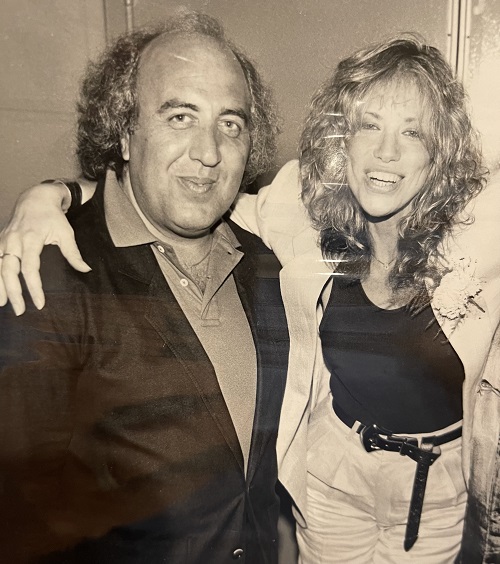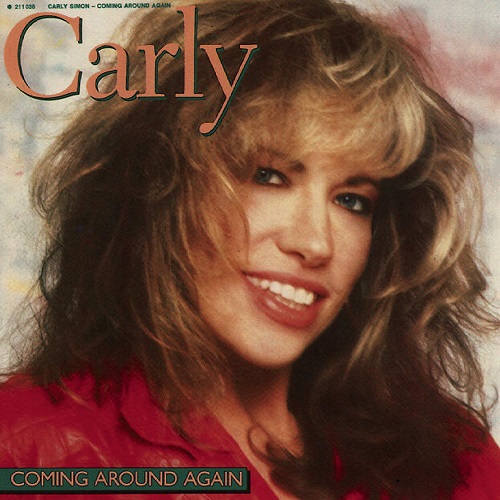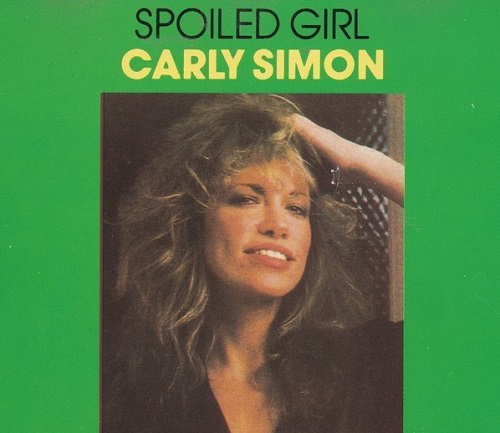Photos courtesy of Lennie Petze
Before Carly Simon formally “let the river run,” she first got her groove back.
Fifteen years into an already landmark career, the songsmith behind such beloved radio classics as “You’re So Vain,” “Anticipation,” and “Haven’t Got Time for the Pain,” would update her look, sound, and presence in the mid-1980s with an album that didn’t sell much initially upon release. However, it would serve as an important steppingstone to her coming around again commercially just two years later.
Spoiled Girl, released in 1985 on Epic Records (her only album for the label) is Carly’s penultimate ‘80s album. Leaving behind her folk and balladry roots, she dives headfirst into the MTV era with synthesizers, rock guitar, and a voice that hits notes never before heard on her prior albums. In essence, it’s a perfect therapy record, especially since this work also contains some of Simon’s most biting lyrics ever written:
– “You come on like a prince, you got everyone convinced that you’re a prince of a man. But I’m the one who knows, I’m the one you show that you don’t give a damn.” (“Can’t Give It Up”)
– “I wish you had never loved anyone but me…” (“Anyone But Me”)
– “Now I don’t feel undone and I don’t feel afraid. There’s nothing quite so cold as the heart you’ve betrayed.” (“Black Honeymoon”)
The album would peak no higher than Number 88 on the Billboard Top 200, her lowest charting effort at the time. But in revisiting her collective discography (as she awaits induction this year into the Rock and Roll Hall of Fame), this work is just as important — and just as stellar — as her others.
Spoiled Girl is an album that has Simon shaking off the coffee clouds from her 1983 divorce to James Taylor (see above), gaining her individual confidence back, and reveling in her femininity. For anyone who felt Simon may have been too timid or nervous in her music previously, this is the album that shows she’s unafraid to revel in newfound love, call out toxic masculinity, or throw darts and shade at the notion of status.
“I jumped at it because I always loved her as an artist,” says album executive producer Lennie Petze, then senior vice president of Epic and Portrait A&R. “For me, it was just finding great songs, put the right guys in the studio playing, and her voice. That’s the way I felt about the album — she’s the artist, let’s just make sure that we build great tracks around that vocal.
But this shift in Simon’s sound and musical experimentation doesn’t happen overnight. Really it begins in 1980 with the release of her brooding Come Upstairs album and its hit track, the wholly underrated “Jesse.” Yet even though that track has a sense of female empowerment attached to it, the tide turns by the final chorus as the protagonist succumbs to the masculine charms of the titular Jesse. Then comes the sultriness and sexual energy of the single “Why” in 1982. By the time of Hello Big Man in 1983, Simon begins wavering between the creative line of ingenue and musical fawn seeking protection from the hunter that is exposure.
Really though, Spoiled Girl is the greatest musical extension of “Girls Just Wanna Have Fun” I’ve heard to date. Even on more emotive tracks like “Black Honeymoon” and “Anyone But Me,” Simon makes it clear to listeners that it’s take her as she is or simply fuck off.
Where ex-husband Taylor would release a comeback album the same year as Spoiled Girl (That’s Why I’m Here) that sounds refreshed and full of second chances (a la “Only a Dream in Rio”), Carly goes more rock and loses all timidity. It’s a complete about face. The same singer who would plead and yearn on tracks like “The Way It Always Should Be” is gone and replaced with a voice that can’t be tamed but sounds glorious. Even in one moment on “Come Back Home” where Carly sounds like she will lose the note, she shifts her voice and goes higher in her register. It’s the perfect twinge of vulnerability before taking on a fighter’s personality.
The album kicks off with “My New Boyfriend” which is about as unfettered freedom conceptually as you can get on a track. Watch the accompanying music video and see Simon’s million-dollar smile dominate the screen throughout as she gets a visual jump on The Bangles by two years (try to guess why!). But while you cheer Simon on for being able to pick up the pieces and be happy, the album becomes gradually more and more serious as it progresses. There’s a much-welcomed edginess and fierceness to her vocals on tracks like “Can’t Give It Up” and “Interview,” an arguable inspiration for Expose’s 1987 Top 10 smash “Let Me Be the One.”
“Tired of Being Blonde” (“She left the credit cards under her goodbye note”) and “Spoiled Girl” are yuppie anthems while “The Wives Are In Connecticut” is a playful romp of supposed infidelity and “who dunnit.” Yet this song is a true highlight because the hook includes a mighty choir and signals where Carly is headed creatively with “Let the River Run.” Here, the notion of ‘80s excess and male invincibility is shattered once you hear that wonderful melding of voices, all of whom form the foundation of her Grammy, Golden Globe, and Oscar-winning track.
“I thought that was so clever because she knew what my life was like. I was traveling in and out of the city from Stamford and she met my wife; she realized that this is going on all the time — guys who work in the city and living in Connecticut,” Petze told me.
On Spoiled Girl, it’s clear Simon is no longer concerned with appealing to anyone’s standards. Hell hath no fury like a woman scorned but if this is Carly scorned, it’s truly a heavenly effort. One that’s tongue in cheek and not designed to resemble her first four albums. Rather, it’s one that shows it’s OK to celebrate when you toss away the shackles of standards and live your best life. In other words — you go, girl!
“One of the things (Carly) liked to do, and it was very unique to me because I had been making records for quite a while, was she loved to do her vocals in the control room,” Petze says. “She didn’t care about being on the other side of the glass, if you will.”
Despite industry professionals calling the musical shots on most albums, Petze makes clear that the bulk of creative ideas and input on Spoiled Girl came directly from Simon herself.
“She’s the artist — take us in the direction you want. And this is the way she wanted to go,” he says. “That’s the way I felt about the album: ‘She’s the artist, let’s just make sure that we build great tracks around that vocal.’”
Through her management, Simon declined to be interviewed about the album for this column.

Petze adds that while Simon’s deal with Epic was for one album (with potentially more based on Spoiled Girl’s success), he would work with Simon on securing the strongest possible personnel to make it, including drummer Russ Kunkel, engineer Frank Filipetti, producer Robby Kilgore, guitarist G.E. Smith, and lyricists Larry Raspberry and Andy Goldmark.
“We never felt she was straying anywhere. It was just making a great record. That’s what we tried to do,” Petze said. “There wasn’t a lot of material to start with, but I knew that after we had that first track [“Tired of Being Blonde”], it felt like a single to me. We said, let’s go. Let’s get the material. We started looking for songs for her and so forth. We wanted her to write too, of course. She brought together a lot of great people”
“When we finished the album, I can remember going to Unique Studios to listen to the playback — her and I and Russ, just the three of us,” he adds. “We were so excited about the album. It had a great feel to it. The material was there. She was never oppressive or anything like that. She was tremendous to work with, one of the best experiences of my career in the studio.”
Alas, the album would mark the end of Simon’s commercial slump before the release of 1987’s Coming Around Again and her return to Top 40 singles. But as Simon sees her Hall of Fame hopes become that much more realized, I highly recommend revisiting this work. Do so and you’ll see why I was so keen to write this column. Simon should never be labeled as an artist who succeeded under the influence of others; she’s a tremendous artist in her own write.
“It just seemed like it wasn’t the right time for her for some reason. We tried different remixes. We tried going into the AOR area with “Boyfriend.” It was just a disappointing situation,” Petze said. “But it was a great project, and I really was excited about it when we finished.”
“Listen, I still listen to the record. I have it on vinyl, I have it on CD, I have it on cassette. Every once in a while, I grab one of them and put it on,” he adds. “I still think it’s a great album.”

***
Share your feedback and suggestions for future columns with Ira at vinylconfessions84@gmail.com. Ira’s new book, “Hello, Honey, It’s Me”: The Story of Harry Chapin, is available for purchase here.




















